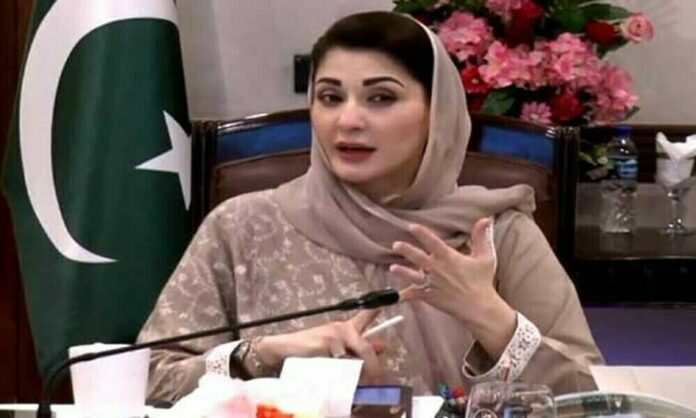- Advertisement -
MULTAN, Apr 25 (APP):In a bold stride toward gender equality and social progress, Chief Minister Maryam Nawaz Sharif has steered Punjab onto a transformative path, placing women’s empowerment at the center of her governance agenda. The province, under her leadership, is witnessing an unprecedented shift as targeted initiatives unfold across various sectors — from education and economic empowerment to legal protection, mobility, and public service inclusion. These initiatives are not only addressing the structural inequities faced by women but also equipping them with tools to claim their rightful space in society.
A flagship initiative launched by the Punjab government is a Rs. 2 billion livestock distribution program, specifically tailored for 11,000 widows and divorced women in the underdeveloped belt of South Punjab. Through the distribution of cows and buffaloes, the program aims to establish sustainable income sources for women in districts like Multan, and some others where access to employment opportunities remains limited. The project offers more than livestock—it brings hope and a sense of dignity to thousands of households run by women, said Deputy Director Dr Jamshaid Akhtar while talking to APP.
Chairperson Society for Society Persons Zahida Hameed Qureshi also appreciated Himmat Card Scheme and Assistive devices for wheelchair users and other persons with disability. She stated that they were thankful to Punjab government for taking such excellent initiatives.
Social figures like Saima Faiz, Zahida Khan and some others also hailed CM Punjab Maryam Nawaz for taking steps for women.
They added, the provincial government has ramped up support for women entrepreneurs by offering interest-free loans and accessible business financing. These financial instruments were designed to foster economic independence, especially for those venturing into small and medium enterprises. The scheme encourages women to break traditional barriers and venture into businesses that once felt unreachable due to lack of capital and societal constraints.
Housing security, a crucial yet often overlooked component of women’s empowerment, has also been addressed through the “Apni Chhat Apna Ghar” initiative. Under this scheme, women receive interest-free loans to construct homes. This move not only ensures physical shelter,but symbolizes a larger message of ownership, control, and long-term stability for women who often live at the mercy of male family members or landlords, they shared.
Cultural and social barriers often hinder a woman’s progress, and marriage expenses were one such challenge for families with limited resources. The “Dhee Rani” program steps in to organize mass weddings for underprivileged girls. It is a remarkable program which would be remembered for longtime. This not only eases the financial burden but also helps families preserve dignity in societies where social prestige is closely tied to wedding ceremonies. These events are conducted in a celebratory environment, showcasing a commitment to inclusive traditions, the both social figures remarked.
Punjab government is committed to ensuring equitable access to learning. The government’s Talented Scholarship Program allocated 60 percent of its 30,000 awards to female students this year. With plans to expand the program to include 50,000 scholarships annually and to incorporate students from private institutions as well, the move aims to democratize education and ensure girls, regardless of socio-economic status, don’t fall behind.
Recognizing the importance of digital inclusion in a technology-driven world, the government has also begun distributing laptops and offering advanced IT training to young women. This initiative is already bearing fruit, with hundreds of girls gaining not only digital literacy but also a foothold in competitive tech-oriented job markets. Additionally, Women Development Centers established in various public universities are providing academic and psychological support, ensuring girls stay focused and confident in male-dominated fields, they added.
However, empowerment is incomplete without safety and legal recourse. The revitalization of Women Protection Centers has turned once-dormant facilities into lifelines for survivors of violence. Legal aid, psychological counseling, medical treatment, and shelter are now provided in a streamlined, accessible manner.
In a critical step toward systemic change, the Punjab government has also introduced the Acid Sale Regulation Bill, which seeks to regulate the sale of harmful substances to prevent acid attacks. This is part of a broader effort to enhance women’s physical security and ensure that perpetrators of violence face legal consequences.
Public service inclusion has been strengthened with the increase of the women’s quota in the Punjab Public Service Commission from 10% to 15%. This single policy change promises to shift the landscape of governance, opening up thousands of government roles to qualified women. Simultaneously, over 1,600 women have been recruited on open merit into the Punjab Police force — a feat that signals growing gender representation in law enforcement, traditionally a male stronghold. Saima heaped immense praise on CM Maryam for her special initiative to ensure mobility, a crucial aspect of autonomy, which is being addressed through the distribution of electric bikes to women across the province. Momina, a university teacher also appreciated and stated e-bikes were more than a commuting tool; they symbolize freedom and accessibility, enabling women to pursue education, work, and leisure without dependency.
Moreover, the establishment of 16 working women’s hostels and 307 daycare centers reflects the government’s recognition of the challenges. These centers offer safe housing and childcare, allowing women to work without compromising their children’s care or safety. It’s a practical and progressive step that ensures women can balance professional and personal responsibilities with ease.
The “Pink Games” initiative, which promotes women’s participation in sports and recreational events, is further broadening the scope of empowerment. By encouraging girls and women to engage in physical activities, this program is redefining traditional gender roles and promoting physical and mental health, Momina concluded.

